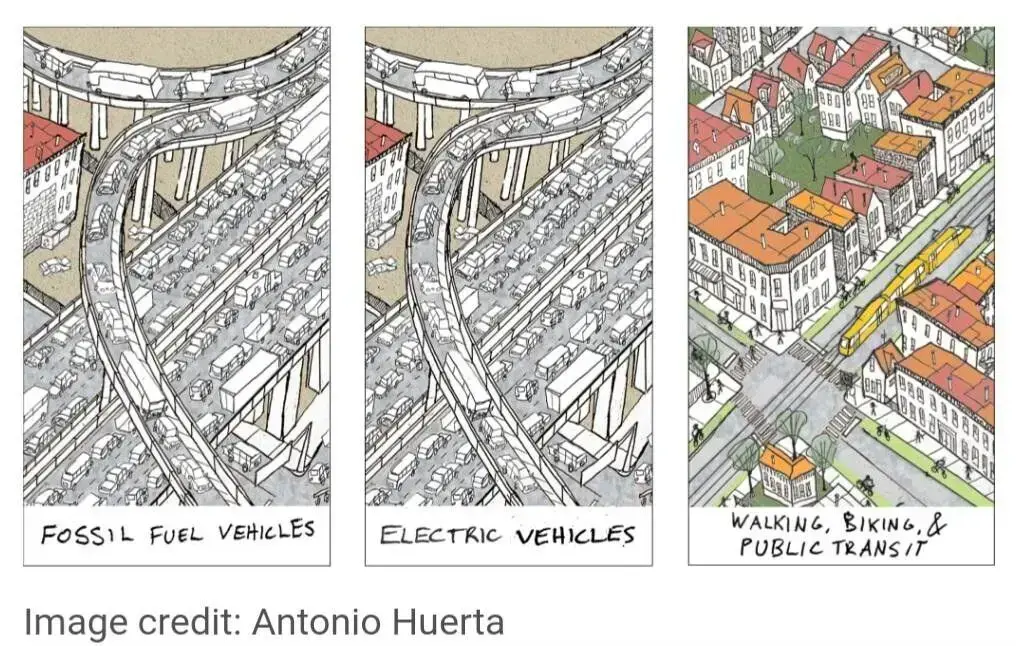
Right is possible if economy is local. Left is actual real life because of capitalism needs bigger markets in in small areas for maximing profits.
Trains
You can’t have bigger markets in smaller areas with cars because the cars take up so much space. Public transport gives access while still allowing for density, which provides a much larger market. The only ones losing out are the auto makers and oil companies.
Don’t bother mate, the people in this community don’t live in reality.
Hello. I used to live in Bremen which is an economy hub in Germany. It’s pretty much image #3
Several years ago, I considered an EV, got sticker shock, and slowly backed away. I wound up with an ebike instead. What happened with the latter is it turned out I really loved that thing and rode it far more frequently than I would have imagined. It’s not a total car replacement, to be fair, but it handles most trips.
Today, EVs are still expensive, though there are more options and a bit more competition on price. But to make them worthwhile, you need to drive a lot so that you get back some of that initial investment in savings with charging vs fuelling. This means I am not really the demographic for EVs anymore, since I don’t drive enough. It’s so weird… I guess I’ll just keep that 2006 ICE around until it dies, which might be awhile yet considering how slowly the mileage is ticking up.
They’re a solution, not the solution indeed.
Not really. At all. Like they’re barely even a bandaid.
The issue is a car weighs a couple of tons and it’s being used to move a person who weighs around 100kg.
It’s massively inefficient use of energy.
Even in some fantasy world where the energy used to charge the batteries is all renewable - not even close to reality but let’s pretend - all that lithium and other precious earths are still an environmental disaster.
The answer is mass transit and lower mass vehicles. A lifestyle change is actually required and the thing is it wouldn’t even make people less happy, just that change is so fucking scary for some reason.
Walkable cities are a dream lifestyle and an electric scooter in a walkable city is outstanding. Fuck urban sprawl.
I’d call them less a solution, more an attempt at harm reduction.
And the only things they’ll properly resolve are tailpipe emissions and idling noise. At least one of which is of no concern when dealing with the externalities of car traffic.
If you really want to solve the environmental impact of transportation, you minimise the need for transportation. Put homes and workplaces close together, offer mass alternatives for the pairs where you really do need motorised mobility solutions, and minimise the number of situations where it’s more convenient to take a car. Ban on-street parking and heavily tax off-street parking. Need to park your car in the city? Hope you can afford to pay an arm and a leg. Oh, you can’t? Looks the Park & Ride at the train station two towns over is the nearest alternative. Don’t worry though, the trains go six times an hour and a day ticket is, like, four quid max.
Quid: you’re British. Great.
You’re smaller in area than Texas. It’s a little easier for you to stay close to everything, you’re never more than 70 miles away from the sea.
Hello, I’m Albertan. Stop saying this. Our governments maintain roads in between these cities every year, there is no reason they couldn’t have been train lines instead. Roads are far more expensive than many realize.
Once upon a time, all cities were connected by train, and we ripped it all up to build roads instead. Sure, it’s going to cost money to build these up again – that’s what happens when we make a mistake, we have to pay for it in one way or another. But connecting smaller towns and cities is not the herculean impossible task that people seem to want to pretend it is.
There ARE major urban areas in North America. People are not evenly spread out across the landmass equally. Connecting these first is obviously the goal, because that will take care of 70% of the problem already. And always remember not to make perfect the enemy of good - even if we stopped there we’d be in infinitely better shape than we were before.
Look mate, if you’re going to shove the “tHe stATeS arE ToO bIG, thus wE cANNot SOlvE The transIt ProbleM” rhetoric on us, please find another place to wallow in your lack of trains while assuming car industry rhetoric as undeniable fact.
Also, your claim has been debunked and reclarified so often that I’m not going to begin to explain just how wrong you are.
Sorry, chief. We don’t do nuanced thought in this community.
Disagree on inefficient.
Internal combustion engines in standard small size convert 19.65-22.1% of their energy from thermal to kinetic.
The ratio of electron throughput from battery to electric motor can be as LOW as 88% but hovers between 92-98% efficiency.
Even if you had a fuel cell in the back, running electric motors quintuples (5×) the standard energy efficiency owing to the principle of energy quality type preservation in conversion (High to High vs Low to High):
https://en.wikipedia.org/wiki/Energy_transformation
So 1 electric car = 4 less carbon liquid fuelled cars worth of pollution.
What you’re actually looking for is:
https://en.wikipedia.org/wiki/Jevons_paradox
Jevon’s Paradox states that improved efficiency of something will only increase its use, and in this case, electric cars will in fact, correlate to car use, and increased mineral demands.
This is a problem you cannot solve endemic to humanity.
I think the point is that compared to public transport when transporting a large number of people, they are inefficient.
My favorite part about this sub is how everyone acts like the entire world is able to just stop having a car and be able to carry on normally about their lives as if cars haven’t been forced into nearly all infrastructure plans globally since this inception. Like it’s every citizens personal choice that nobody built a functioning transit system in the many decades before they were born, or that the place they can afford to live is too far from the place that pays the wages they need to live is too far to bike or bus to.
Like, push for fewer cars and less car centric design, but also stop being a fucking cunty dick about it.




